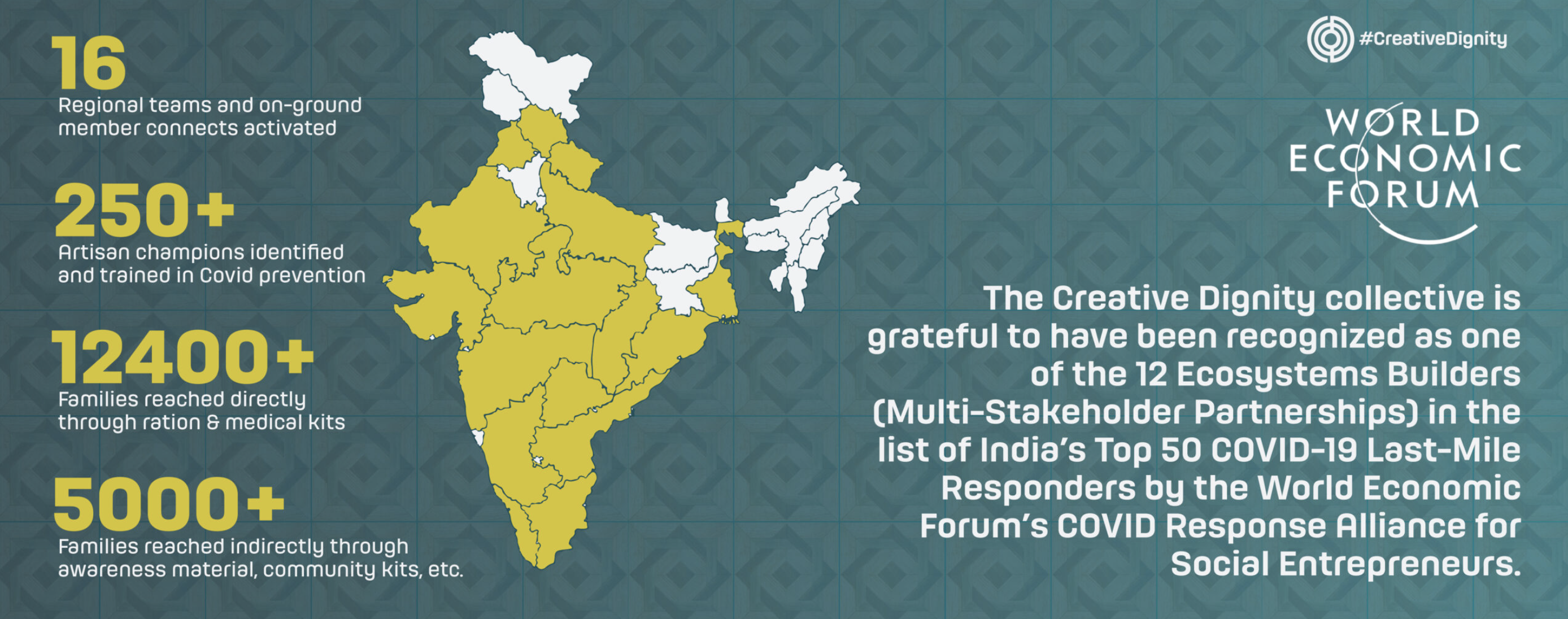A Case Study on Rapid Network Movement for COVID Relief
The global pandemic and ensuing lockdowns brought about a sudden and devastating loss of livelihoods for informal workers around the world. One such group that came into sharp focus was the community of artisans in India. Social organizations that supported artisans by developing markets for their work were desperate to find alternative sources of income for the struggling artisans and their families. A handful of such organizations quickly realized that they could not rely solely on handouts from the government or private charities, and they needed a large network of diverse talent to locate alternative avenues of support.

Creative Dignity
Out of this crisis arose a network movement, branded as Creative Dignity, within three months.
Creative Dignity brought together over 500 artisan enterprises and collectives, civil society organizations and professionals who volunteered their time to find and provide immediate relief, catalog the available inventory of artisanal products, and establish almost overnight online marketplaces.
Operational structure
Creative Dignity created 16 different regional teams that were composed of volunteers and artisan groups. They broke their work down into three phases, which were relief, rehabilitation, and rejuvenation. During the relief phase which was the first three months of the pandemic, volunteers focussed on the most pressing needs of the artisans, which were providing cash, food, and health supplies to prevent starvation and aid those afflicted with COVID. Creative Dignity also disseminated a countrywide survey to artisans to ascertain their levels of unsold stocks of products. The rehabilitation phase, which took place for the following nine months of the pandemic, worked to equip artisans with tools, training, and market access to enable them to move their stocks and resume earning sustainable incomes. The final phase, called rejuvenation, started at the end of the first year of Creative Dignity, and is still currently underway. This phase aimed to solidify and scale incomes for artisans, and to continue to grow the artisan sector.
Impact
Creative Dignity proved to be a successful method for support during the pandemic, and provided various levels of aid based on need. During the relief phase, they reached over 12,400 families directly and provided ration and medical kits, and 5,000 families indirectly through awareness materials and preventative training to slow the spread of Covid in artisan communities. During the rehabilitation phase, they created over 350 digital catalogs for artisan groups, helping them to share their products in a way that buyers could easily understand and place orders. They collaborated with 12 online marketplaces to onboard over 130 artisan groups to sell their stocks direct to consumers. Creative Dignity was able to generate $600,000 in sales of stocks for artisan groups, which was vital income that was otherwise inaccessible during the pandemic.
Principles
Creative Dignity was innovative and differed from previous artisan organizations in India due to the pressure from the pandemic: the goal was survival of artisans and vulnerable families rather than purely economic competition. The pandemic enabled stakeholders of an otherwise diverse and dispersed artisan sector to collaborate and lay the foundation for an unprecedented voluntary network alliance. Their five main principles that Creative Dignity followed were integral to this approach:
- Artisan at the center: At all times and in all our endeavors, we will keep the artisan at the center. Every opportunity and activity will be evaluated by the impact it has on the artisan through a set of metrics.
- Collaborate not compete: We will collaborate with transparency and not compete with one another. We will not use another’s idea, design, IP, people or process without permission. We will seek to co-create value with others. We will amplify and celebrate each other’s work.
- Open source: We will openly share information, data, opportunities, knowledge, skills and networks with each other. We will build on each other’s work, rather than reinvent the wheel.
- Trust: We will trust each other unless someone gives us a reason not to. We will be respectful in every way, choosing kindness and generosity as our ethos.
- Accountability: As CD is a self-governed, self-motivated and self-driven movement, we will operate with the fullest integrity and remain accountable for our behavior, words and actions.
Through employing these principles and working collaboratively rather than competitively, Creative Dignity was able to maximize its impact, and share networks rather than gate-keep access to markets. They built a foundation for more sustainable livelihoods for artisans than the previous fractured ecosystem, and this model can be used and replicated around the world to build more supportive and successful artisanal enterprises.
0 Comment
Leave a Reply